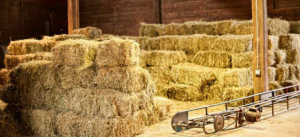 Can freshly-baled hay be fed to horses immediately? Must there be a curing period following baling and before feeding? Horse owners know that hay is often least expensive when it has been baled recently. Some people get an even deeper discount if they haul the bales from the hayfield themselves.
Can freshly-baled hay be fed to horses immediately? Must there be a curing period following baling and before feeding? Horse owners know that hay is often least expensive when it has been baled recently. Some people get an even deeper discount if they haul the bales from the hayfield themselves.
Hay cultivation, like so many specialties within crop production, has been fine-tuned in recent decades. When done well, it is as much art as science. Specifically, producers are able to accurately gauge moisture content and choose the best time to bale hay.
“If hay is baled with a low moisture content, less than 12%, it can be fed right away, and horses shouldn’t have any problem with it,” said Kathleen Crandell, Ph.D., longtime nutritionist for Kentucky Equine Research (KER).
The notion of a “curing” phase is not a new one, and Crandell pinpoints its origin easily:
“Some traditional horsemen believe that fresh-baled hay should ‘sweat’ for two to four weeks before feeding,” she says.
“This allows the hay to cure, which might be important if the hay too wet when it was baled. Wet hay typically goes through a fermentative state, of sorts, and it would not be good for the horse to eat it while this was happening,” she continued.
Caution should be used in purchasing hay that was wet when baled. Too much moisture affects the quality of baled hay.
“If the hay is put up with too much moisture, there is risk for mold and dust proliferation. Hay with severe ‘water damage’ can be discolored, usually yellow or brown, and can be nutritionally empty for horses,” Crandell explained. “From a safety standpoint, these bales may get too hot and catch on fire.”
For these reasons, in addition to nutritional quality, it is better to find hay that has been properly dried in the field and baled.
In choosing to feed current-season hay, be sure to take the time to acclimate the horses to it gradually, as with all new feedstuffs. Horses on all-forage diets do not receive all of the nutrients they need for optimal health.
J & J Hay Farms sells only first quality hay period. You can see it, smell it and touch it in every bale we sell. We care about your horse’s health!
Article source: KER.
